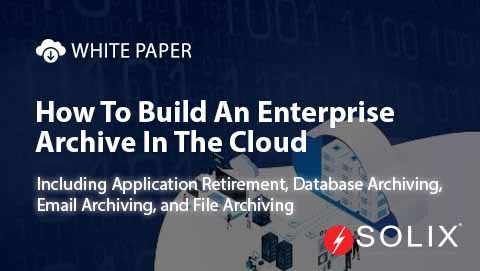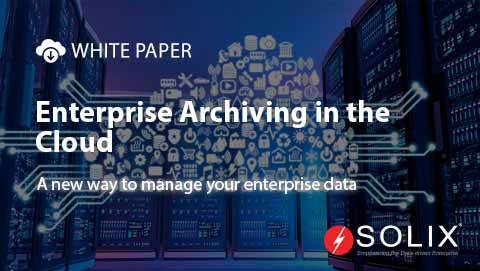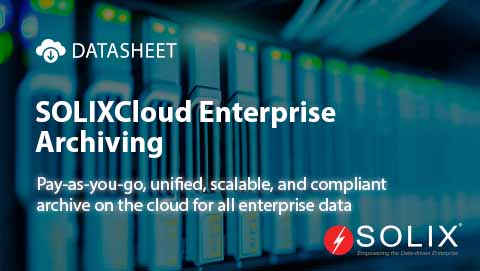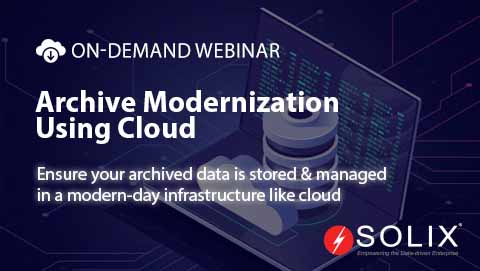Use Case Data Archiving Tools
When businesses accumulate vast amounts of data over time, managing and preserving that data effectively becomes a necessity. This is where use case data archiving tools come into play. For organizations looking to optimize their data management processes, these tools offer critical solutions for archiving information that may no longer be actively utilized but is still essential for compliance, analysis, and potential future use. Understanding the best use cases for these tools can revolutionize how your organization deals with its data landscape.
Data archiving is not just about storage; its about ensuring that your data is accessible when you need it, while also keeping your primary systems clean and efficient. In this post, Ill explore various use cases that highlight the importance of data archiving tools, share practical scenarios, and provide actionable insights to help you make informed choices. Additionally, Ill touch on how Solix can serve your data archiving needs through innovative solutions tailored for your organization.
Understanding the Core Functionality of Data Archiving Tools
Before we dive into the use cases, its important to understand what data archiving tools actually do. These tools help organizations identify, move, and store data that is no longer actively used in the primary database but should still be retained for operational or compliance purposes. By utilizing data archiving tools, companies can reduce costs associated with storage, improve system performance, and ensure compliance with relevant regulations.
Effective archiving tools intelligently assess data lifecycle management and can automate processes like data classification, retention scheduling, and secure storage. This means businesses can avoid the common pitfalls of data sprawl and reduce exposure to risks associated with data loss or legal challenges.
Use Cases for Data Archiving Tools
Now, lets explore some specific use cases where data archiving tools can work wonders. In my 15 years in the data management space, Ive seen these scenarios play out time and again.
1. Compliance and Regulatory Requirements
One of the most crucial use cases for data archiving tools is to ensure compliance with ever-evolving regulatory standards like GDPR, HIPAA, or FINRA. Organizations are required to keep certain records for specified durations, and failure to comply can lead to serious consequences.
For example, a healthcare provider must archive patient records for a set time frame even after their treatment ends. A data archiving tool can automate this process and ensure that the records are both accessible and protected, thus reducing legal risk and enhancing trust with patients.
2. Cost Efficiency and Resource Optimization
Data storage can quickly become expensive, especially when dealing with on-premise infrastructure. By utilizing use case data archiving tools, organizations can offload less frequently accessed data to more cost-effective storage solutions.
Imagine a retail organization that collects hundreds of gigabytes of transaction data each year. By archiving past sales data, they free up the primary database for more recent transactions. This not only saves costs but also significantly improves system performance, allowing for faster processing times and a better user experience.
3. Data retention and Disaster Recovery
Having a solid disaster recovery plan is essential for any organization. Data archiving tools play a significant role here by not only storing older data securely but also ensuring that it can be restored quickly when needed.
Consider the case of a financial institution that faces a cybersecurity attack resulting in data loss. If theyve utilized data archiving tools properly, restoring essential records can be done swiftly, ensuring business continuity and reducing downtime.
4. Business Analytics and Historical Insight
Archived data is not just dead weight; in fact, it can offer significant insights into business trends over time. By utilizing historical data, organizations can perform analytics that inform strategic planning and decision-making.
For instance, a manufacturing company may want to analyze production data from previous years to identify trends in operational efficiency. With the right use case data archiving tools in place, valuable historical data can be accessed easily, leading to informed decisions that propel the business forward.
How Solix Fits into the Picture
Speaking of solutions, Solix is particularly well-suited for these scenarios with its cutting-edge data management solutions. Solix offers comprehensive tools for enterprise data management and archiving, designed specifically to help organizations meet their unique data needs.
With Solix Data Archiving Solutions, youll find a user-friendly platform that automates the archiving process, helping organizations to keep both compliance and cost-efficiency in check. Solix tools simplify the task of retaining and retrieving archived data, allowing you to focus on what matters mostdriving your business forward.
Lessons Learned and Actionable Recommendations
After years of observing data management practices across different industries, Ive distilled some key lessons that I believe can guide organizations in selecting and implementing data archiving tools
First and foremost, understand your specific compliance obligations. Know what data you need to retain and for how long. This understanding will inform your archiving strategies and help in selecting the right tools.
Secondly, take the time to assess the volume of data that your organization generates. By evaluating data lifecycle management, you can determine which data should be archived and which can be removed from active storage.
Lastly, dont overlook the importance of personnel training. Ensure that your team is well-equipped to utilize the data archiving tools effectively, as this will maximize your investment and minimize potential risks.
Final Thoughts
In an increasingly data-driven world, having the right use case data archiving tools is indeed a game-changer for businesses. Whether you are looking to enhance compliance, drive cost-efficiency, enable disaster recovery, or gain analytical insights, these tools are vital components of an effective data management strategy. Solix reliable archiving solutions can help you achieve these goals, adding considerable value to your data management approach.
If you have questions or need guidance on implementing data archiving tools in your organization, I encourage you to reach out to Solix. Their team is available to assist you by calling 1.888.GO.SOLIX (1-888-467-6549) or via their contact pageThey are committed to helping you make the most out of your data management strategies.
About the Author Kieran is a data management consultant with over a decade of experience working with organizations to implement effective use case data archiving tools. He is passionate about helping businesses maximize their datas potential in compliance, efficiency, and analytics.
The views expressed in this blog post are those of the author and do not necessarily reflect the official position of Solix.
Sign up now on the right for a chance to WIN $100 today! Our giveaway ends soon‚ dont miss out! Limited time offer! Enter on right to claim your $100 reward before its too late! My goal was to introduce you to ways of handling the questions around use case data archiving tools. As you know its not an easy topic but we help fortune 500 companies and small businesses alike save money when it comes to use case data archiving tools so please use the form above to reach out to us.




